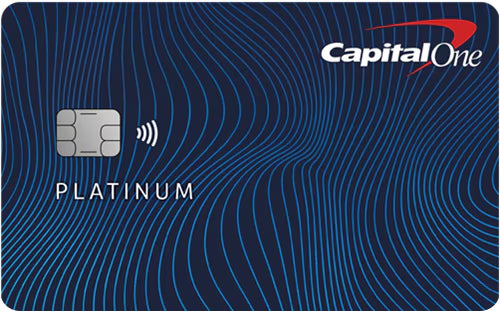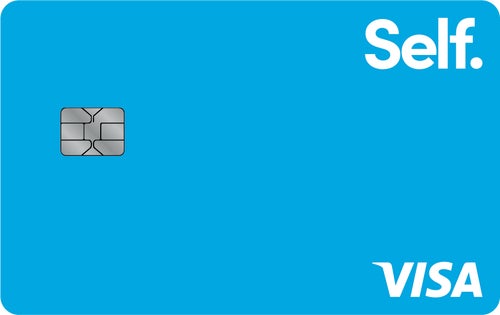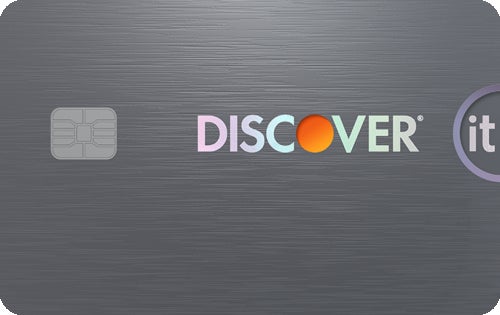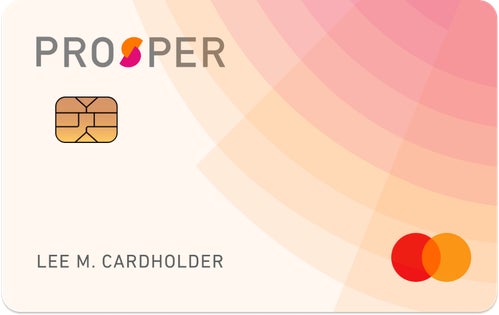| Credit Building Rating: | 3 / 5 |
| Cost of Membership | 2.0 |
| Ease of Building Credit | 4.5 |
| APR | 1.0 |
| Features | 3.8 |
In a Nutshell:
The Prosper Card can help you build credit and not much else. You won’t earn rewards and you won’t have many perks to find added value. It’s a good card if you want to keep things simple when learning the ropes of credit cards while you work your way toward better cards.
Security Deposit Required None |  |
Initial Credit Limit Up to $3,000 |  |
Access To Higher Credit Line? Prosper will periodically review your account to determine your eligibility for increases |  |
APR 23.24%-34.74% Variable |  |
Annual Fee $59 (waived for the first year if you sign up for autopay before your first statement) |  |
Other Rates and Fees Minimum interest charge: $1.00 ($0.50 for Maine residents) |  |
Rewards None |  |
Pros
Cons
Why you might want the Prosper Card
You should consider the Prosper Card if you want a decently high credit limit on an affordable credit-building card that can help you qualify for better cards.
Relatively high credit limit
With this card, you can secure a credit limit of up to $3,000, a remarkable starting point for anyone new to credit. A $3,000 limit can give you plenty of breathing room for spending and maintaining optimal credit utilization. There’s no guarantee you’ll qualify for this limit, but you can review your card terms before opening your account.
If you don’t qualify for this limit but still want the card, you still have a chance to boost your limit with responsible card use. Prosper will monitor your card use and review your profile periodically to see if you qualify for a credit limit increase. A feature like this can give you the push you need to pay on time routinely, never borrow more than you can pay off right away and stay on the right track to a better score.
Affordable credit-building
With no security deposit required, you can get started with the Prosper Card with minimal out-of-pocket costs. Plus, as long as you sign up for autopay, you won’t need to pay an annual fee for your first year. This incentive makes the card a worthwhile addition to your wallet if you’re new to credit cards and don’t want to feel pressured by the extra responsibility of monitoring your due dates.
Autopay will pay your balance each billing cycle, ensuring you won’t fall behind on payments or accrue hefty interest charges unless you have insufficient funds in your linked account. The card costs $59 annually after your first year when you enroll in Autopay, but this is a fairly low fee relative to the start-up costs of other credit-building and secured credit cards.
You might not even have to pay it if you establish a healthy credit routine that lifts your score into the good credit range before the end of the first year, which could help you qualify for a no-annual-fee rewards card.
Why you might want a different credit-building card
You won’t earn rewards or have flashy perks or benefits, dampening this card’s value. That said, this card is more of a bridge between fair and good credit — a point at which you’ll have several rewarding options to choose from.
Heavy APR for routine borrowers
Regardless of your APR, you should never carry a balance, but this card charges a particularly high interest rate. Interest payments will quickly pile on any balance you carry month to month, making your road to good credit much longer.
If you can’t pay your balance in full every billing cycle, you should avoid a credit card altogether, especially high-interest credit cards. However, if you don’t have a choice and need access to credit, you should only use your card for small purchases that you can immediately pay off. Doing this will help you build credit, maintain a low credit utilization and minimize risk.
Look at a high interest rate as another incentive for a card like this. If a high APR lingers on your mind, you should use your card sparingly and always pay on time to avoid accruing a mountain of debt that will bury your credit-building efforts.
Lacks ongoing rewards
Credit card rewards are a treasured fixture of the best credit cards and they’re frequently a dealbreaker for potential applicants when a card doesn’t have them. They’re rarely found on credit-building cards, however, so it’s not unusual the Prosper card doesn’t have them. It’s just disappointing.
Although rewards can be a distraction when building credit, they can be a friendly reminder that the card in your wallet isn’t just a worthless chunk of plastic. Building credit happens in the background, so staying motivated and on track is difficult when your score isn’t updated every day.
Rewards are an incentive for using your card that you can see relatively quickly. Plus, building familiarity with earning and redeeming rewards can help you strategize your next card decision. The world of cash back and rewards credit cards is loaded with options and knowing which card will help you earn the most rewards is an important step when deciding on the best card for you.
How does the Prosper Card compare to other credit-building cards?
The Prosper Card isn’t a groundbreaking card by any means, and it won’t get you to a better score any faster than other credit cards can. Your spending habits and financial profile are the only things that can help you. That said, other options might suit you better. Here are a few of them.
 |  |  |
|---|---|---|
Rewards rate
| Rewards rate
| Rewards rate
|
| Credit limit See terms | Credit limit $100-$1,700 (equal to your deposit) | Credit limit $300-$5,000 |
| Annual fee $0 | Annual fee $0 annual fee for the first year only, $25 annual fee thereafter., waived for the first year | Annual fee $0 |
Other things to know
| Other things to know
| Other things to know
|
Prosper Card vs. Capital One Platinum Credit Card
The Capital One Platinum Credit Card is an unsecured credit-building card that doesn’t charge an annual fee. It’s a better choice if you want a simple card for everyday purchases to build credit passively. Compared with the Prosper card, you might have a more seamless experience with Capital One when upgrading to a better card. Once you’ve established a healthy credit history and have a higher score, you can upgrade the Capital One Platinum card to another, more rewarding Capital One card.
Prosper Card vs. The Card with No Credit Check – The secured Self Visa® Credit Card
If you don’t mind complicated steps that can help you maximize your credit-building efforts, The Card with No Credit Check – The secured Self Visa® Credit Card offers a multi-layered approach to building credit. It will take much more upfront effort than the Prosper Card, but the secured Self Visa® Credit Card diversifies your credit mix, which is a modest part of how credit bureaus determine your credit score. You might be able to build your score faster with the secured Self Visa® Credit Card, but it will require more attention to detail and a higher start-up cost.
Prosper Card vs. Discover it® Secured Credit Card
The Discover it® Secured Credit Card is a secured credit-building card that stands out for its valuable rewards program and generous welcome offer. You won’t find another secured card with as much potential first-year value. If you want to build your credit and earn rewards, the Discover it® Secured Card is your best option because it has a great welcome offer and a decent ongoing rewards rate. Plus, like Capital One, Discover is a major issuer. You can seamlessly upgrade from the Discover it® Secured to a more rewarding Discover credit card when you’ve established a better score.
How to use the Prosper Card
- Enroll in autopay to waive the card’s annual fee for the first year.
- Pay your balance in full every month to avoid the card’s high APR.
- Never use more than 30 percent of your available credit limit to keep your credit utilization low.
- Use the card for small, routine purchases that you can quickly pay off when they post to your account.
Is the Prosper Card right for you?
The Prosper Card could be a good choice to avoid security deposits and annual fees in your first year. Although the card lacks rewards and perks, you could use this card to jump-start your credit journey and build your score. But if you want to maximize your credit-building efforts or earn rewards, better options are available.
The right card for you will help you accomplish your credit goals. If getting good credit is your goal, this card can help. If learning how to earn and use rewards while building credit is your goal, you might want to choose a different card.
*All information about the Prosper® Card has been collected independently by CreditCards.com and has not been reviewed by the issuer. The issuer did not provide the content, nor is it responsible for its accuracy.
All reviews are prepared by CreditCards.com staff. Opinions expressed therein are solely those of the reviewer and have not been reviewed or approved by any advertiser. The information, including card rates and fees, presented in the review is accurate as of the date of the review. Check the data at the top of this page and the bank’s website for the most current information.
Responses to comments in the discussion section below are not provided, reviewed, approved, endorsed or commissioned by our financial partners. It is not our partner’s responsibility to ensure all posts or questions are answered.
